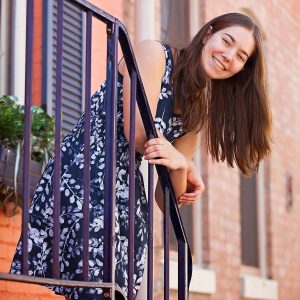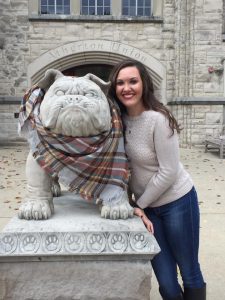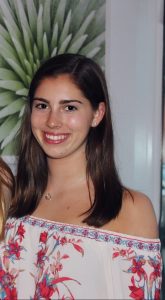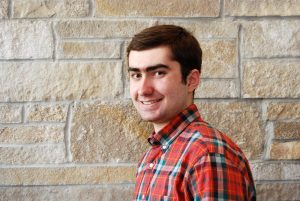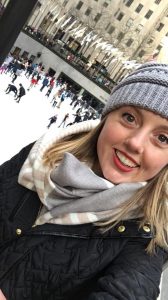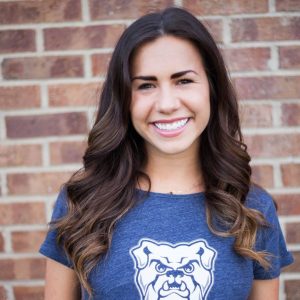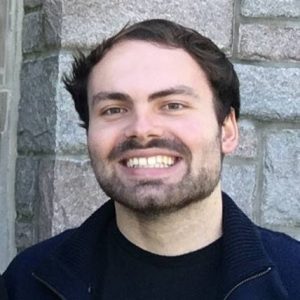Welcome to this inaugural post of my new blog! I’m excited to share with my readers some of the wonderful work we do at Butler University’s Center for Faith and Vocation, specifically our important work of interfaith engagement and vocational discernment. In my posts I hope to explore some of these issues in more depth, share stories from the work of the CFV, introduce you to our CFV Scholars and interfaith leaders on campus and in our community, and much more.
But first, I suppose an introduction is in order. I am the Center for Faith and Vocation Scholar in Residence and Instructor of Religion at Butler, where I’ve taught since 2008. I am a Christian theologian by training, and I identify with the Lutheran Christian tradition as a lifelong member of the Evangelical Lutheran Church in America. I did my BA in Religion and History with a minor in Classics at Gettysburg College in Gettysburg, Pennsylvania, my MA in Historical Theology with a minor in New Testament from the Lutheran Theological Seminary at Gettysburg, and my PhD in Theology at Union Theological Seminary in Richmond, Virginia. I also earned a certificate in German at the Goethe Institut in Dresden, Germany.
At Butler I teach a number of courses related to Christian theology and the Western intellectual tradition, including the First Year Seminar “Faith, Doubt, and Reason” and upper-level courses on God, Evil, Liberation Theologies, Religious Pluralism, and Ecotheology. For several years I also taught Religions of the World and Ethics, the Good Life, and Society, both part of Butler’s Core Curriculum. I directed the 2015-2016 CFV Seminar on the topic of Religion, Race, and Culture, and I am currently directing this year’s Seminar on the topic of Sacred Places: Intersections of Religion and Ecology.
My research focuses on the history of Christian thought, particularly in the period of the Protestant Reformations of the 16th century, 19th-century and early 20th-century Germany, and contemporary American theology. I also dabble in research on theology and culture, theology and science, and theology and secularism. I have published two books and several articles in American and European journals, and I am currently at work on a third book.
I am an active member of Bethlehem Lutheran Church here in Indianapolis, where I sing in the choir and serve on the Worship Committee and the Pastoral Call Committee. I am also the faculty advisor and a board member for Grace Unlimited, Butler’s Lutheran-Episcopal campus ministry, and I serve on the candidacy committee of the Indiana-Kentucky Synod of the ELCA, which identifies, supports, and evaluates candidates for rostered ministry as pastors and deacons in the ELCA.
I was born and raised outside a small town in Perry County, Pennsylvania, one of only two counties in PA without a traffic light (one was finally installed in 2010, so I suppose that means Forest County wins?), and both sides of my family have deep, deep roots in Perry and Franklin Counties, reaching back to the early 1700s. I am descended from a long line of public school teachers on my father’s side and I am the first on my mother’s side to attend college, an intersection of identities that gives me a profound respect and appreciation for the power and promise of education.
I am a passionate advocate for interreligious engagement and dialogue because I believe that peace and human flourishing begin with understanding. Engagement and dialogue is a vital way of celebrating our diversity while at the same time highlighting how much we ultimately have in common across our very real differences. One of my favorite things about teaching the introductory course in world religions was the opportunity to take students to visit different religious communities right here in Indianapolis and to expose them to the rich diversity and astonishing depth and beauty of our many religious paths.
In my course on Religious Pluralism we focus our attention on the variety of ways Christian theologians have developed to think about and engage the world’s religious traditions. We learn about Christian exclusivism, which insists that Christianity alone is true, about Christian inclusivism, which suggests that Christianity alone possesses the “full” truth but that other religious traditions also contain some “preliminary” or “preparatory” truth, and about various modes of genuinely pluralistic approaches, which hope, each in their own way, to find points of contact and shared values or underlying beliefs within each of the world’s religious traditions, each of which is honored as a unique and equally valid path to truth. One of my favorite images of religious pluralism is found in an old Zen story about a man pointing his finger at the moon. All too often we focus on the finger and forget to look past the finger to the moon itself. This is an illuminating metaphor for how the various religious traditions of the world can be understood as different ways of focusing our attention on the ultimate reality, the “really real,” each from their own unique location and with their own histories, symbols, rituals, ways of living, and worldviews. The “fingers” really are different and can’t be interchanged, but they are all pointing at the same “moon.” This is a metaphor I will be exploring in more detail in future posts.
Here at Butler we have several thriving student religious communities, including Muslims, Jews, Hindus and Sikhs, Roman Catholics, Orthodox, mainline Protestants, several evangelical groups, and secular students, each seeking to help students navigate their undergraduate years while enriching their religious and philosophical commitments. Some of the religious communities seek out opportunities for interfaith engagement, while others prefer to tend to their own communities’ needs. But all are engaged in important and meaningful work of spiritual formation and vocational discernment, study and activism, worship and prayer, fellowship and bonding.
Several years ago Butler introduced the CFV Scholarship, which is a financial scholarship awarded to incoming first-year students who demonstrate a passion for interfaith engagement and social activism. We have had Scholars from a number of religious traditions over the years, but most scholars come to us from Christian, Muslim, and Jewish traditions. The Scholars, along with Butler’s Interfaith Council, form a vibrant community of students who are committed to their own religious path while also valuing teaching, learning, and working with students of other traditions.
Part of my work with the Scholars will be to foster this interfaith engagement and to work with them to invite more Butler students to engage in interreligious dialogue, learning, and service. Students arrive at Butler from all over the country and from diverse backgrounds, and for many students college is the first time they have had sustained interactions with people from profoundly different backgrounds and life experiences. Making personal connections to people from different backgrounds is often the first important step toward building bridges of understanding and respect, so we have a wonderful opportunity here at the CFV to facilitate that work of building bridges and forging deep and lasting friendships between our students of different faiths. I’m excited to play a role in that work as the CFV Scholar in Residence.
Now that you have a better sense of who I am, where I’m coming from, and the kind of work we do at the CFV, I hope you will return regularly to check up on the good and interesting work we do at the CFV!
Until next time…
Brent Hege, PhD
CFV Scholar in Residence and Instructor of Religion
Posted in CFV Scholar in Residence | 1 Comment »
